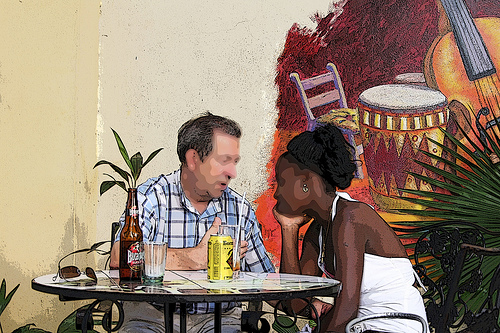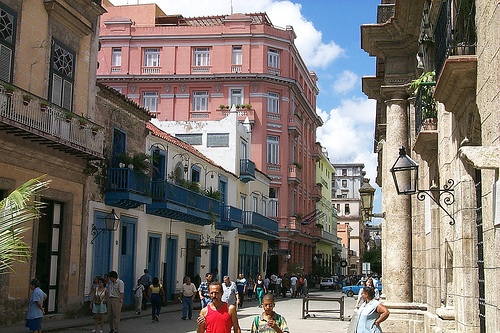Miguel el Jinetero
May 3, 2012 by dykerr
Prior to our trip to Cuba, we learned and were warned about the presence of jineteros on the island. These Cubans were reportedly found in tourist areas offering various services, ranging from directions to the nearest bar to sexual favors, or simply asking for handouts. Upon arriving in Cuba, I did indeed see many examples of jineterismo, and I think all of my peers on this trip have a story or two of being hustled out of a few CUCs. In general, I found these interactions to be largely harmless and often very interesting, certainly not negative experiences at all. What follows is a description of one incident, which I found to be both fascinating and particularly telling about the conditions of life in Cuba and for the jinetero.
During our last afternoon in Havana, a fellow student and I were walking the streets around the Calle Obispo, in the hopes of escaping the tourist crowds and catching a slice of the life of regular Cubans. As we turned a corner, a man called out to us, asking if we had heard that a musician from the Buena Vista Social Club was playing that night. We had, of course (people on the streets had been speaking of little else), but we nevertheless took him up on his offer to show us the bar in which he would allegedly be playing. This man, who introduced himself as Miguel, spoke English very well, and mentioned that he could also communicate in both German and French, skills he claimed to have picked through school and by watching foreign films. We followed him down a few streets until we reached a corner bar, which while pleasant seemed to be an unlikely place to be hosting such a famous musician. We sat down for a cup of coffee and agreed to pay for his drink (a tall Cuba libre).
As we sat and drank, we chatted with Miguel about life in Cuba. He told us that he was 31, had a young daughter, and mostly did odd jobs to get by. (I unfortunately neglected to take pictures.) He expressed to us his frustration at not being able to travel outside the country due to financial restrictions, and advised us to make the most of our opportunities, both in Cuba and around the world. He said that while he was happy with the social services in his country, he wished there could be an extension of private business so as to allow more Cubans access to dollars and therefore a better life.
Throughout the conversation, he was in good spirits, and seemed to be just as interested in us as we were in him. He asked us questions about where we came from and went to school, and was visibly impressed when we told him we lived in New York. Even our assurances that we were well outside the city could not stem his praise. While we were of course conscious of our social positions relative to each other, we were able to let our respective guards down enough to actually enjoy each other’s company. When we expressed interest in the Santeria bracelet Miguel wore, he launched into an enthusiastic description of the faith, in which he extolled us to “give our problems to the sea, Yemalla” and revealed that he (as well as his mother) could be possessed by orishas, the spiritual powers of Santeria. He even went so far as to invite us to his house to witness a ceremony, although we were forced to decline as we were leaving the next day. All this indicates that this meeting was more than simple hustling; rather, it was an earnest exchange between people from very different background, with both parties eager to share and to learn.
When our coffees and Miguel’s drink were finished, we took our leave. Before we left, Miguel asked us if we could spare some money for his daughter, whom he said was sick. We of course gave him a few CUCs, reflecting afterwards that this was a perfect example of the complexity of jineterismo.
Leave a Reply
You must be logged in to post a comment.


